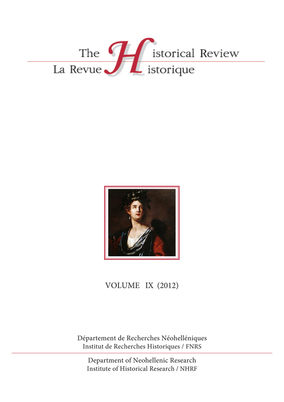Towards Modern Greek Consciousness
Part of : The Historical Review ; Vol.1, No.1, 2004, pages 51-67
Issue:
Pages:
51-67
Author:
Abstract:
This paper deals with the subject of Modern Greek consciousness which can be said epigrammatically to have its starting point in the Provisional Constitution of Greece ratified by the Assembly of Epidaurus in January 1822. For it was then necessary that two crucial questions be answered, namely who were to be considered as citizens of the new state about to be created and what regions it covered. The attempt to find answers to these questions necessarily led to the re-examination of the Greek nation's historical course over the millenia.For this purpose the terms that express the concepts which register the self-definition of a human group and their use over time, are here examined as well as the links that formed the connection between the groups of Greek-speaking Orthodox Christians who, as a result of historical circumstances, had until then been geographically scattered. One solid link was the unbroken use of their common language; the "ancestral culture" was the other definitive element which had a continuous though uneven presence throughout the centuries. Finally the "place", having preserved the same geographical name, "Hellas", through the centuries although its borders were certainly unclear, now took on a weighty significance as regards the conscious identification of the historical land with the new state that the Greeks were struggling to create in the nineteenth century. These and other factors contributed to the acceptance by the Greek nation of the nomenclature Ellines, Ellada which were unanimously adopted during the Greek war of Independence, instead of the terms Graikoi, Romioi, Graikia.
Subject:
Subject (LC):
Notes:
856:https://ejournals.epublishing.ekt.gr/index.php/historicalReview/article/view/3958, DOI: http://dx.doi.org/10.12681/hr.170
Electronic Resources:




